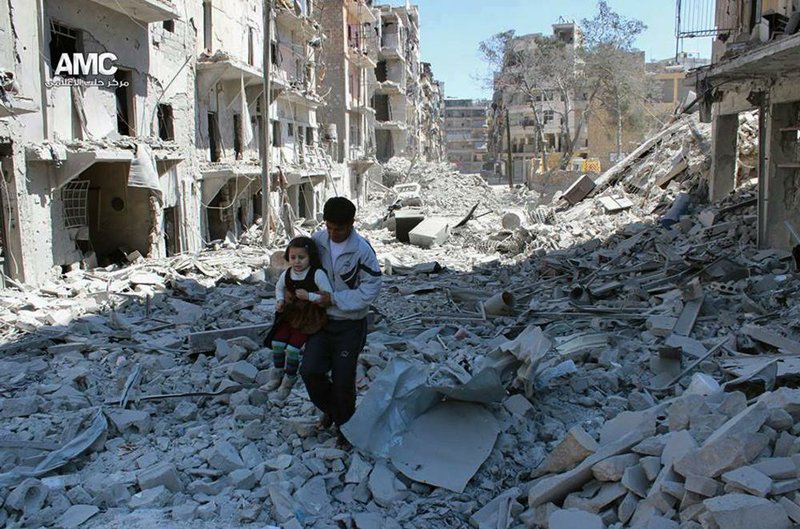DAMASCUS, Syria - Syria called a presidential election for June 3, aiming to give President Bashar Assad a veneer of electoral legitimacy in the midst of a civil war that has killed more than 150,000 people and driven a third of the population from their homes.
The opposition and the United States denounced the vote as a farce, and a United Nations spokesman said it will “hamper the prospects for a political solution.” But Assad’s government appears determined to hold the election to exploit its recent military gains.
The announcement Monday by parliament Speaker Jihad Laham raises questions about how the government intends to hold any kind of credible vote within the deeply divided country, where large areas lie outside government control and where hundreds of thousands of people live in territory that is contested, held by rebels or blockaded by pro-government forces.
“There will not be any voting centers in areas controlled by the gunmen,” Syrian lawmaker Sharif Shehadeh said. He said the Syrian army was present in many provinces across Syria, “and this will make up for the areas outside of government control,” he added.
But Nazeer al-Khatib, an opposition activist in the northern city of Aleppo, said “the only people who will vote are the ones who support Assad.”
Assad, who has ruled the country since 2000, has suggested he would seek another term in office, reflecting his determination to show he is the legitimate leader of Syria.
With the support of his strong allies, Russia and Iran, Assad has strengthened his once-tenuous hold on power in recent months with an ongoing military assault to recapture key urban areas.
“This is an outrage that anyone would even think of holding an election in the midst of this carnage,” said Rime Allaf, an adviser to the head of the main Western-backed Syrian National Coalition opposition group.
“It is a slap in the face of all the efforts of the international community, including the sponsors of the Geneva peace conference,” Allaf added, referring to two rounds of failed peace talks between the government and the opposition held in Switzerland earlier this year.
The coalition has called on Assad to step down in favor of a transitional governing body that would administer the country until free presidential and parliamentary elections can be held.
World leaders have denounced Assad’s intention to hold elections with the country still engulfed in violence.
White House spokesman Jay Carney said Assad was “making a mockery of his own pretentions to be a democratically elected leader.”
“The presidential referendum, which is what this would be, is a parody of democracy and would have no credibility or legitimacy within Syria or outside of Syria,” he said.
U.N. Secretary-General Ban Ki-moon and U.N.-Arab League envoy Lakhdar Brahimi “have repeatedly warned that the holding of elections in the current circumstances, amid the ongoing conflict and massive displacement, will damage the political process and hamper the prospects for a political solution that the country so urgently needs,” U.N. spokesman Stephane Dujarric said.
Until now, Assad has been elected by referendums in which he was the only candidate and voters cast yes-or-no ballots.
Last month, the Syrian parliament approved an electoral law opening the door - at least in theory - to other candidates. The new law, however, placed conditions effectively ensuring that almost no opposition figures would be able to run. It states that any candidate must have lived in Syria for the past 10 years and cannot have any other citizenship.
Laham said those seeking to run for president may register their candidacies from today until May 1. Syrian officials said the May 1 deadline may be extended if there are no presidential candidates by then.
Syrians living outside of the country may start voting May 28, Laham said. It was not clear whether he meant that to include more than 2.5 million refugees in neighboring states - an unlikely scenario because of logistical and political considerations.
The government has presented the elections as the solution to the war, suggesting Assad would step down gracefully if he loses the vote.
Highlighting security concerns even in areas under firm government control, the elections announcement Monday came just hours after a pair of mortar shells struck 100 yards from the parliament building in central Damascus, killing five people, according to state TV. Two more people were killed and 23 others wounded by mortar rounds that slammed into the predominantly Christian area of Bab Touma in Damascus.
Also on Monday, the U.S. said it is looking into whether a toxic chemical was deployed on areas of Syria that are controlled by rebel forces.
State Department spokesman Jen Psaki said Monday that the chemical was likely chlorine, if it was used.
She said officials still are trying to determine what happened in the village of Kafr Zita, but that the U.S. takes allegations about chemicals used in combat very seriously.
Psaki said the U.S. is working with the U.N. and the Organization for the Prohibition of Chemical Weapons to get more details.
Information for this article was contributed by Diaa Hadid, Sylvia Hui, Edith M. Lederer, Julie Pace, Matthew Lee and Lara Jakes of The Associated Press.
Front Section, Pages 5 on 04/22/2014

